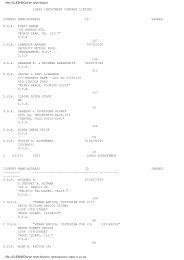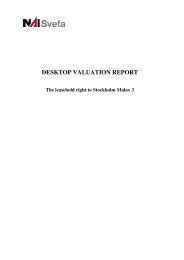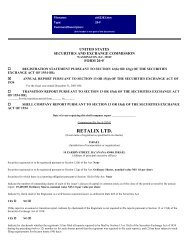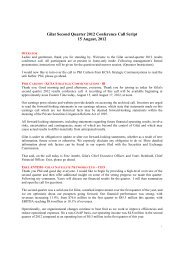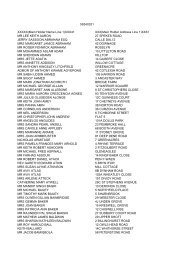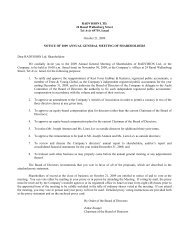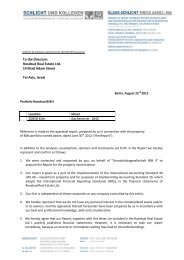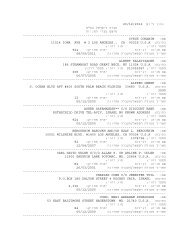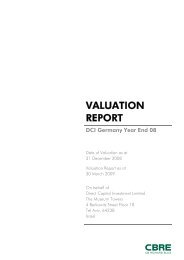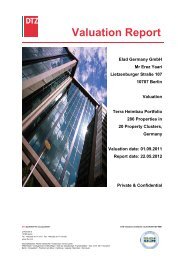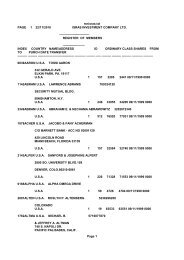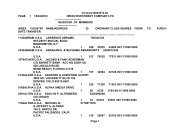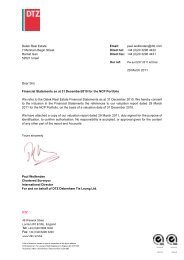XTL BIOPHARMACEUTICALS LTD.
XTL BIOPHARMACEUTICALS LTD.
XTL BIOPHARMACEUTICALS LTD.
Create successful ePaper yourself
Turn your PDF publications into a flip-book with our unique Google optimized e-Paper software.
• the number and scope of our development programs;<br />
• our ability to establish and maintain current and new licensing or acquisition arrangements;<br />
• our ability to achieve our milestones under our licensing arrangements;<br />
• the costs involved in enforcing patent claims and other intellectual property rights; and<br />
• the costs and timing of regulatory approvals.<br />
We may seek additional capital through a combination of public and private equity offerings, debt financings and collaborative, strategic<br />
alliance and licensing arrangements. We have made no determination at this time as to the amount, method or timing of any such financing. Such<br />
additional financing may not be available when we need it. If we are unable to obtain additional funds on terms favorable to us or at all, we may be<br />
required to cease or reduce our operating activities or sell or license to third parties some or all of our technology. If we raise additional funds by<br />
selling ordinary shares or other securities, the ownership interests of our shareholders will be diluted. If we need to raise additional funds through the<br />
sale or license of our drug candidates or technology, we may be unable to do so on terms favorable to us.<br />
We are likely to be subject to taxation in the US, which could significantly increase our tax liability in the US for which we may not be able to apply<br />
the net losses accumulated in Israel.<br />
We currently have a “permanent establishment” in the United States, or US, which began in 2005, due to the residency of the Chairman of our<br />
Board of Directors and our Chief Executive Officer in the US, as well as other less significant contacts that we have with the US. As a result, any<br />
income attributable to such US permanent establishment would be subject to US corporate income tax in the same manner as if we were a US<br />
corporation. If this is the case, we may not be able to utilize any of the accumulated Israeli loss carryforwards reflected on our balance sheet as of<br />
December 31, 2007 since these losses were not attributable to the US permanent establishment. However, we would be able to utilize losses<br />
attributable to the US permanent establishment to offset such US taxable income. As of December 31, 2007, we estimate that these US net operating<br />
loss carryforwards are approximately $22.4 million. These losses can be carried forward to offset future US taxable income and will begin to expire in<br />
2025. US corporate tax rates are higher than those to which we are subject in the State of Israel, and if we are subject to US corporate tax, it would<br />
have a material adverse effect on our results of operations.<br />
Risks Related to Our Intellectual Property<br />
If we are unable to adequately protect our intellectual property, third parties may be able to use our technology, which could adversely affect our<br />
ability to compete in the market.<br />
Our commercial success will depend in part on our ability and the ability of our licensors to obtain and maintain patent protection on our drug<br />
products and technologies and successfully defend these patents and technologies against third-party challenges. As part of our business strategy, our<br />
policy is to actively file patent applications in the US and internationally to cover methods of use, new chemical compounds, pharmaceutical<br />
compositions and dosing of the compounds and composition and improvements in each of these. See “Item 4. Information on the Company - Business<br />
Overview - Intellectual Property and Patents,” below regarding our patent position with regard to our product candidates. Because of the extensive time<br />
required for development, testing and regulatory review of a potential product, it is possible that before we commercialize any of our products, any<br />
related patent may expire or remain in existence for only a short period following commercialization, thus reducing any advantage of the patent.<br />
The patent positions of pharmaceutical and biotechnology companies can be highly uncertain and involve complex legal and factual questions.<br />
No consistent policy regarding the breadth of claims allowed in biotechnology patents has emerged to date. Accordingly, the patents we use may not be<br />
sufficiently broad to prevent others from practicing our technologies or from developing competing products. Furthermore, others may independently<br />
develop similar or alternative technologies or design around our patented technologies. The patents we use may be challenged or invalidated or may<br />
fail to provide us with any competitive advantage.<br />
Generally, patent applications in the US are maintained in secrecy for a period of 18 months or more. Since publication of discoveries in the<br />
scientific or patent literature often lag behind actual discoveries, we are not certain that we were the first to make the inventions covered by each of our<br />
pending patent applications or that we were the first to file those patent applications. We cannot predict the breadth of claims allowed in biotechnology<br />
and pharmaceutical patents, or their enforceability. Third parties or competitors may challenge or circumvent our patents or patent applications, if<br />
issued. If our competitors prepare and file patent applications in the US that claim compounds or technology also claimed by us, we may choose to<br />
participate in interference proceedings declared by the United States Patent and Trademark Office to determine priority of invention, which could result<br />
in substantial cost, even if the eventual outcome is favorable to us. While we have the right to defend patent rights related to the licensed drug<br />
candidates and technologies, we are not obligated to do so. In the event that we decide to defend our licensed patent rights, we will be obligated to<br />
cover all of the expenses associated with that effort.<br />
9



